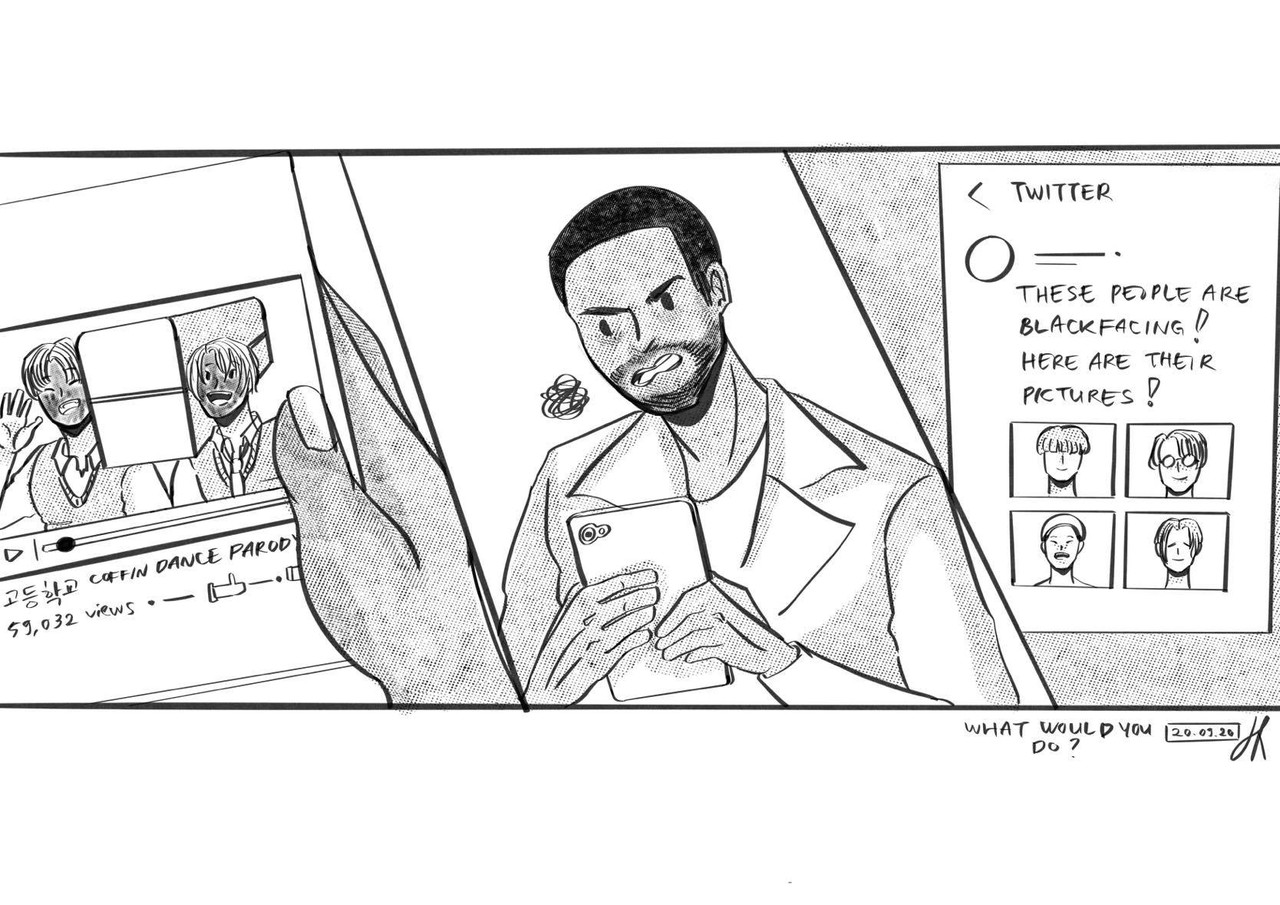Sam Okyere, Ghanaian celebrity in South Korea, has received public backlash from criticizing a yearbook photo of Uijeongbu High School students. The photo included five students parodying the Dancing Pallbearers or the “coffin dance”, unfortunately, in blackface. This debate will explore multiple perspectives on the event in an attempt to explore Korean society’s stance on the issue, as well as explain societal causes of such incidents.
The Sam Okyere controversy is a concoction of different sentiments, values, and priorities gone sour. Before deconstructing the incident, the following assumptions must be established. First, blackface, historically used to mock enslaved Africans in the US, is racist. Second, in an ideal world, different societies with varying cultures will come to learn and respect elements of other societies. Of course, the reality is never that simple, nor ideal.
The first curveball to the controversy is the delivery in addressing the racist incident. While the question of whether the yearbook photo is racist is divided among the Korean public, the way Okyere expressed his frustration with the blackface is almost unanimously criticized. Although his Korean comments were less controversial, his English remarks received serious backlash. In an Instagram post, Okyere pressed for the need to “educate people here in Korea” and declared that their “ignorance cannot continue”. Such phrases, especially in the eyes of the Korean culture that values knowledge, can sound disparaging as it insinuates the audience’s inferiority to the speaker.
While Okyere’s method of communication was evidently clumsy, the public’s reception to his message was also far from ideal. Netizens criticized Okyere’s “offensive” delivery and brought up his past racist incident of imitating the “slanted eye” to rebuke his hypocrisy. However, most simply glossed over the core of the issue he was trying to raise: that blackface is “offensive”. The flaws in Okyere’s delivery is not a pardon to ignore his message. Then, a reasonable question to ask is: would the public reception be different if he voiced his opinion in a less degrading way? To answer, one must consider alternate perspectives.
The Rising Sun Flag from Imperial Japan is a taboo in South Korea, as it represents Japanese imperialism during the early 20th century. While its offensive nature is widely known in East Asia, it is rarely recognized as offensive in other regions, such as the West. When singer Anne-Marie appeared in a photo with celebrities Ant and Dec who wore Rising Sun Flag bandanas, many South Korean fans sought to raise awareness on the issue. Now, hypocrisy plays a role. If Koreans point out to others about the offensive nature of the Rising Sun Flag, it is reasonable to expect them to be able to accept the criticisms on blackface. The converse also applies to the West.
Here is the pitfall: both sides must point out the insensitivity to each other, but neither have enough knowledge and context on the matter. An aggressive approach to spread awareness will therefore typically not be taken well. To make matters worse, the default state of one society is to be indifferent to the insensitivities of the other. Drastic changes in awareness can only occur if the constituents of that very society also become proponents to whatever change that is ought to occur. For instance, Okyere posting on Instagram cannot generate visible change unless Koreans themselves begin to spread awareness as well — the Rising Sun Flag is no different. However, such change is unlikely as unless one society is directly affected by the matter, political correctness alone is not powerful enough a force to create meaningful change. This generates an unfortunate loop of ignorance, indifference, frustration, and conflict — without any particular side to blame.
It is important to realize that this is not a binary issue of blackface and the Rising Sun Flag. Rather it is a complication of countless cultural insensitivities from societies worldwide. Recently, a professor in the US was fired for saying the Chinese word “na ge”, which sounds similar to the N-word. There is a danger in prioritizing one culture over another, especially when it involves similar cultural elements. Because there is no single set of equations, nor answers, collisions are inevitable with the increasing interactions of different societies. Now, Okyere’s frustrated tone on his Instagram post and the public’s overly negative reception to his message, regardless of moral rights or wrongs, can be explained. While individually one should work to resolve cultural differences, on a societal level, this conundrum of cultural insensitivity will linger for quite a while.


